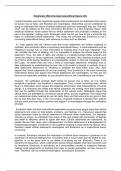Emotivism offers the best meta-ethical theory (30)
Logical Positivists and non-cognitivists argued ethical statements are statements that cannot
be proven true or false, and therefore are meaningless. Meta-ethics can be understood by
trying to understand the nature of ethical statements and how meaningful they are. The term
“best” can be defined as the most convincing. Emotivism is a Non-Cognitive theory (with
empirical evidence) which claims that an ethical statement only professes a feeling on the
part of the speaker, nothing more. Emotivism does not tell you how to live a moral life but
helps us understand Moral statements. This essay will conclude that Emotivism is not a
convincing meta-ethical theory, with reference to critics such as Rachels.
AJ. Ayer agreed with the Vienna circle that moral statements are neither analytical or
synthetic, thus emotivism offers a convincing meta ethical theory. A moral statement such as
"Stealing is wrong!” has no more information or meaning than if one says "Stealing!". You
can consider the facts of stealing, but it is impossible to analyse the ethical aspect of the
statement. Thus, the idea of rights and wrongs is a pseudo-concept (false concept) and
cannot be tested by sense experience (verification principle). Also showing emotions such
as of horror whilst saying "stealing' is an unanalysable content. In his book “Language, Truth
and Logic”, he stated there are only 2 kinds of meaningful statements. Analytical (true or
false statements by understanding the term, like 2+2=4 which is logical) or synthetic (true or
false statements determined by checking to establish the facts either way). Also, Ayer
argued that 'moral judgements do not say anything', thus Emotivism is the most convincing
meta-ethical theory and argues that ethical statements are meaningless, as they are not
facts as not empirically verifiable, as you shouldn't have to ask if something is true or false.
However, the verification principle itself cannot be proven true or false, as it is neither
analytical or synthetic, and therefore is meaningless. Thus, a more convincing meta -ethical
theory is Naturalism which argues that objective ethical laws exist independently of human
beings. It is empiricist and states that ethical properties are nothing more than statements
that can be justified through the observation of the natural world. Naturalists argue that
ethical terms are definable on non-ethical natural terms, and are cognitivist. This means that
our experiences share meaning as we can verify them and that some acts are good or bad,
due to how they feel. Also, in the 21st century, empirical evidence is desired from science
and the world and Ayer rejects science and argues it is meaningless through the verification
principle .
Emotivism offers the best meta-ethical explanation because some people base their ethical
statements and views on their beliefs, emotions, and feelings. C.L. Stevenson argued that
some individuals make an ethical statement to influence others behaviours. For example,
‘Abortion is wrong’. An individual may speak of this and protest with expression of feelings
and belief to influence others to agree with them. Ethical statements are descriptive, so
people discuss their views, and a disagreement of ethical statements is a disagreement of
fundamental principles. Emotivism is non-cognitive meaning it exists within the human mind,
therefore makes ethical statements meaningless and Emotivism as a meta-ethical theory
convincing.
In contrast, Emotivism reduces the importance of ethical terms because if goodness is an
expression of personal feelings (boo or hurrahs) ‘then it would seem that my dislike for say,
abortion, is on the same level to my dislike of stubbing my toe’ (Rachels). There is no
hierarchy for discussion, which undermines serious ethical debates that have occurred such
as Hiroshima. Emotivism is reductionist as it oversimplifies morality to subjective feelings,
making moral judgements on anything from rape to murder impossible, as they convey no
truth. Therefore, can be rendered meaningless, according to Emotivism.




